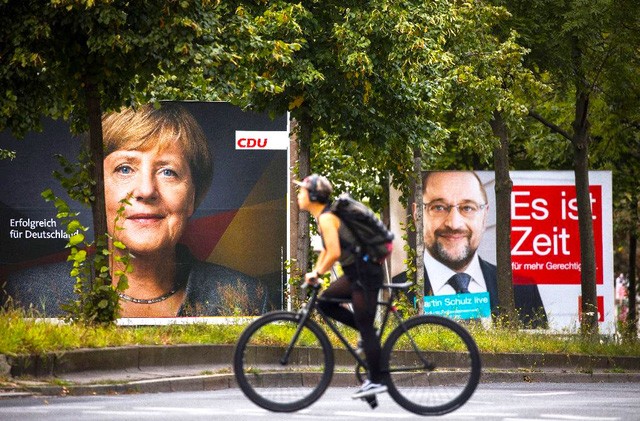(VOVWORLD) - German Chancellor Angela Merkel’s CDU/CSU coalition won a projected 33% of the vote in Germany’s federal elections on Sunday, which means Merkel will serve for a fourth term as Chancellor. The result is important for Germany and for the economic and political unity of the EU.
 German Chancellor Angela Merkel’s CDU/CSU coalition won Germany’s federal elections on Sunday German Chancellor Angela Merkel’s CDU/CSU coalition won Germany’s federal elections on Sunday
|
Germany has the biggest population and economy in the European Union. It has great influence on the EU’s policies. Chancellor Merkel is a strong supporter of EU cohesion.
Germany’s growing status in the EU
Over the past 2 decades, Germany has played a central role in the EU. It has gained regional trust for its stability, its economic and military strength and its responsible and steady foreign policies. Its political role is evident in the German-French cooperative mechanism, which has long promoted cooperation in the EU.
Economically, Germany has helped the EU escape the recent financial crisis. Germany’s influence has been shown in economics, finance, and political reform, as well as in security and diplomacy. Chancellor Merkel and the EU have patiently managed the migrant crisis, a pressing issue in the EU.
A report by the European Council for Foreign Affairs (ECFR) shows that Germany was the most influential country on the EU’s external policy in 2015 and 2016.
Merkel’s victory supports the EU’s stability
With her support for migration and EU cohesion, Merkel’s victory sends a positive signal to the EU. As leaders within the EU, Germany and France have striven to strengthen and renew the EU to avoid disintegration and a possible economic and financial crisis triggered by Britain’s exit from the EU, the public debt crisis in Greece, free trade liberalization, and a deteriorating relationship with the US.
Merkel believes the EU should be more economically independent. Early this year the French President and the German Chancellor agreed in principle to organize a Eurozone parliament and budget, increase public investment within the EU, and work more closely toward reform. Merkel agreed to establish a European Monetary Fund (EMF) to help the EU cope with any monetary crisis without depending on the IMF in Washington.
Merkel is determined not to let nationalism and populism weaken the EU. She says the era in which the EU could depend on others is, to a certain extent, over and the Europeans truly have to take their fate into their own hands. The EU is building an independent alliance led by Germany and France to balance other world powers.
Obstacles
Generally the German election should have a positive impact on the EU. But there is also a downside. The election result reveals a social division which could have a long-term impact. The Social Democrat SPD party says it will not ally with the CDU/CSU to form a coalition government. Merkel says she will hold talks with the FDP party and the Greens. This could make for a complicated coalition because the CDU/CSU coalition, the FDP party and the Greens have serious differences on economic policy and EU reform. The FDP has rejected the French President’s reform policy, while Chancellor Merkel appears to be a Macron supporter. Some EU leaders are concerned about the FDP’s stance on the budget and migrant quotas. If the FDP joins a coalition government, Germany’s policy on EU issues could change.